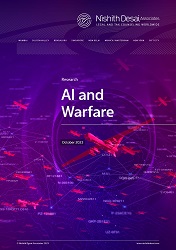AI and WarfareOctober 12, 2023
Chambers and Partners Asia Pacific 2023: Top Tier for Tax, TMT, Employment, Life Sciences, Dispute Resolution, FinTech Legal Legal 500 Asia Pacific 2023: Top Tier for Tax, TMT, Labour & Employment, Life Sciences & Healthcare, Dispute Resolution Benchmark Litigation Asia Pacific 2023: Top Tier for Tax, Labour & Employment, International Arbitration AsiaLaw Asia-Pacific 2023: Top Tier for Tax, TMT, Investment Funds, Private Equity, Labour and Employment, Dispute Resolution, Regulatory, Pharma IFLR1000 2022: Top Tier for M&A and Private Equity FT Innovative Lawyers Asia Pacific 2019 Awards: NDA ranked 2nd in the Most Innovative Law Firm category (Asia-Pacific Headquartered) RSG-Financial Times: India’s Most Innovative Law Firm 2019, 2017, 2016, 2015, 2014 DisclaimerThe contents of this Publication should not be construed as legal opinion. View detailed disclaimer. |
|

In an era characterized by rapidly evolving technological advancements and the increasing integration of AI-driven autonomy in the weaponry system has given rise to a new revolution in the realm of warfare. The paper delves into the profound impact of advanced artificial intelligence, particularly Autonomous Weapons Systems or Lethal Autonomous Weapons, on the realm of warfare and deterrence. It highlights the potential advantages and risks associated with AI-driven weaponry systems, focusing on AI-directed drones and autonomous weapon systems. While AI has the potential to reduce human casualties and enhance deterrence, it also poses a significant challenge in terms of decision-making and control and ethical challenges. The paper emphasizes the need for regulation and international cooperation to ensure that AI technology is harnessed responsibly in the context of warfare. Amidst the arguments for and against the use of AI-driven technology in warfare, the paper extends its scope beyond technological innovation as it analyses the necessity of considering international human rights and legal implications in the rapidly evolving landscape of AI-driven warfare. The integration of AI in military operations raises concerns about reduced decision-making windows, reliance on AI for strategic and tactical assessments and the potential for unintentional escalation, as depicted in a scenario of an accidental nuclear war. This comprehensive analysis highlights the urgency of establishing legal frameworks and international agreements to ensure the responsible use of AI in warfare, all while acknowledging the complexities arising from competitive technological advancements among major global powers. Please click here to access our paper. Warm regards, The author would like to thank Sehar Sharma, Anchal Singh, Garima Mehta and Rakshita Agarwal for their research assistance and contributions.
For any help or assistance, please email us on concierge@nishithdesai.com. Do visit us at www.nishithdesai.com.
|
Disclaimer
The contents of this hotline should not be construed as legal opinion. View detailed disclaimer.
Research Papers
Compendium of Research Papers
Clinical Trials and Biomedical Research
in India
Cybersecurity Law and Policy
|
NDA Hotline |




